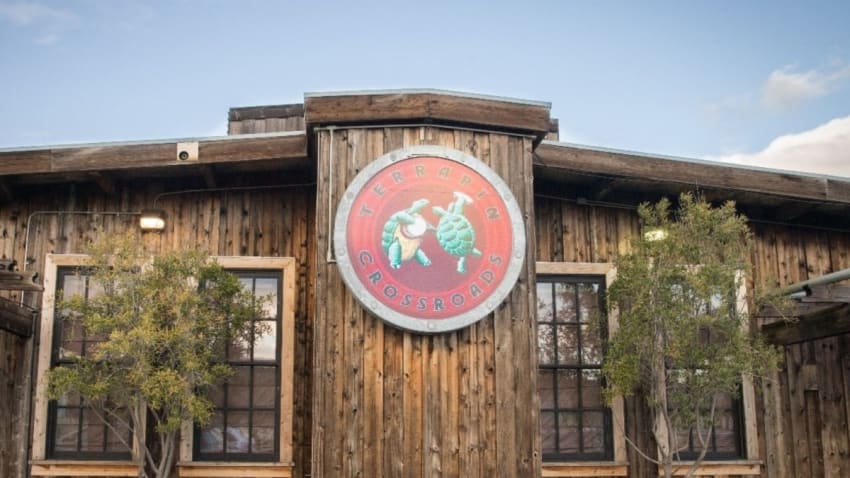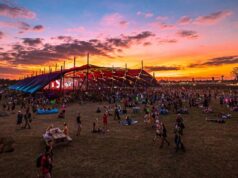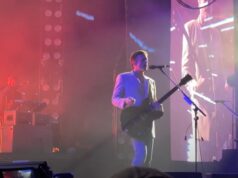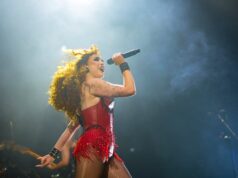
Grateful Dead bassist Phil Lesh opened Terrapin Crossroads in San Rafael, California on March 17, 2012. The concert hall and restaurant facilitated the growth of an important and vibrant community of musicians and fans that flourished through the venue’s closure in November 2021.
For Part Two of JamBase’s retrospective series exploring the legacy of Terrapin Crossroads, several musicians who were closely associated with TXR were asked to share their memories of the special space. Those who responded included Lebo (Dan Lebowitz), Ross James, Alex Koford, Nicki Bluhm, Ezra Lipp, Scott Guberman, Paige Clem and Craig MacArthur.
.article-summary-wrap {
margin-top:25px;
}
.panel-article .list-posts > li {
border-style: dotted;
}
.panel-article .list-posts > li:last-of-type {
border-bottom-width:0;
}
.panel-article .list-posts .excerpt {
margin: 3px 0 0;
}
.panel-article .list-posts .btn-sm {
margin-top: 10px;
padding: 3px 10px;
}
!function ($) {
$(function(){ // document readyvar ga_event_args = {
hitType: ‘event’,
eventCategory: ‘Article Summary Shortcode’,
eventAction: ‘Show Article Summary’,
eventLabel: ‘https://www.jambase.com/article/terrapin-crossroads-retrospective-part-1’,
nonInteraction : true
};console.log( ‘JB – Analytics Event’ );
console.log( ga_event_args );try {
__gaTracker(‘send’, ga_event_args );
} catch(err){}$(document).on(‘click’, ‘.article-summary-wrap a[data-guid=”8401288531997ec-0769-426e-b789-f2dede56d666″]’, function(e){
var ga_event_args = {
hitType: ‘event’,
eventCategory: ‘Article Summary Shortcode’,
eventAction: ‘Click Article Summary’,
eventLabel: ‘https://www.jambase.com/article/terrapin-crossroads-retrospective-part-1’
};console.log( ‘JB – Analytics Event’ );
console.log( ga_event_args );try {
__gaTracker(‘send’, ga_event_args );
} catch(err){}});
});
}(window.jQuery);

Terrapin Crossroads’ Legacy: Part 1 – ‘Some Rise’
On the 10th anniversary of the opening of Terrapin Crossroads, JamBase begins a retrospective series celebrating the community that formed around the venue opened by Phil Lesh.
The resulting oral history tells part of the Terrapin Crossroads story through the voices of many who were integral in its formation and growth. In some cases, the musicians also held official jobs at TXR. Regardless of their employment status, to a person, each of the respondents described a place and moment in time that impacted them both professionally and personally and will not be forgotten anytime soon.
Terrapin Crossroads proved to be a special gathering spot from the beginning. For those who would eventually regularly perform at the new venue, news of its opening was met with eager excitement.
Dan “Lebo” Lebowitz: I remember hearing that Phil Lesh was going to open a club in Marin. Not too long after that I heard about TXR opening its doors. I was most definitely intrigued – little did I know that it would become one of the linchpins of my musical life here in the Bay Area!
Paige Clem: The first time I walked into the Grate Room would have been back in those very early days … I just remember it seeming like a really cool room, like a little baby Fillmore with the chandeliers that were a nice touch. It’s funny because it always kind of seemed like a weird layout with the stage going horizontal versus vertical, but it ended up being one of the things that really made it a special room because you were never too far from the stage and it always just had this unbelievable intimacy with just being able to reach out and touch people.
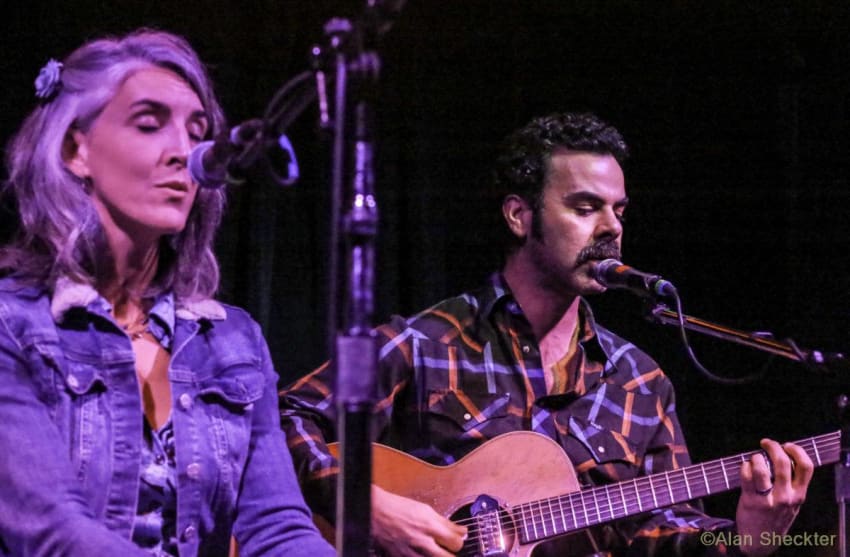
Paige Clem & Dan “Lebo” Lebowitz / Photo by Alan Sheckter
Craig “CMac” MacArthur: The first time I learned about Terrapin was reading about the concept and plans they had to build a Levon Helm-like barn venue in Fairfax. They had a sketch of the proposed building and a business model for the shows they were going to throw along with the way they were going to incorporate the local music community as well (The Terrapin All-Stars). I was pretty excited to say the least. When they finally opened the venue in San Rafael, after the push back from the Fairfax community, (which was a good call because that would have created the biggest bottleneck of traffic ever, since there are only very few limited roads to get in and out of that area of Marin) I was very excited that the ball was rolling.
Scott Guberman: I came across Terrapin Crossroads on Facebook, watching a video of Phil playing live in the bar. My immediate feeling was I’ve got to get there. I had been looking for a way to hook up with the Grateful Dead so I could play with any one of the members – Phil definitely being my first choice. This seemed like I’m going to finally have the opportunity after watching him shake hands with people in the bar and play with people basically within arms reach next to him. Conversations after the show with people, and pictures just made it all seem like I’ve got to get there and let Phil know who I am and just let him know that I’m his guy …
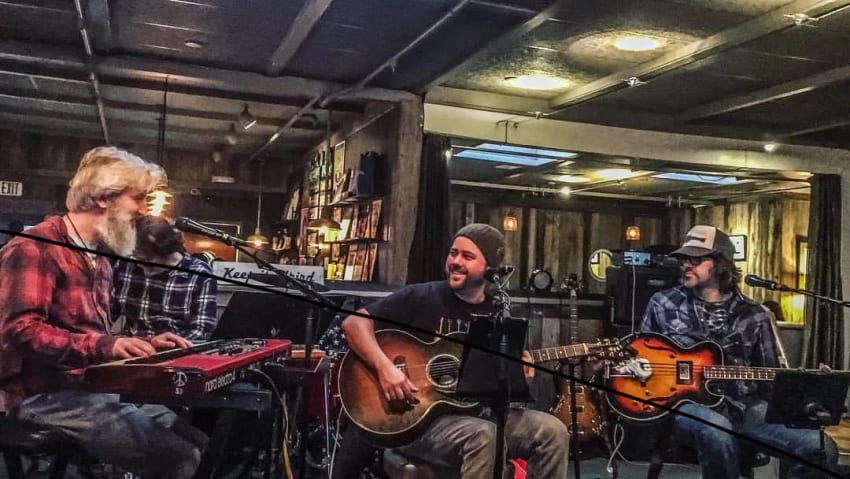
(L-R) Scott Guberman (keys), Craig MacArthur (guitar), Brian Rashap (bass) Photo via casualcoalition.com
Alex Koford: I was in a tough spot in my life and I received a signed poster from Phil of one of the first TXR Grate Room shows. I believe he wrote something like, “Come rock out.” I got down to Terrapin very quickly and got a job working with the door crew for Grate Room shows. If you were coming to shows in 2012 there’s a good chance I put a wristband on you.
Ross James: The first time that I heard about Terrapin Crossroads was I think probably reading it in the newspaper or talking to [Phil’s son] Brian Lesh about it when we were rehearsing at their house. And then the first time I talked to Phil about it, I was actually at a Christmas party in Marin county. I’d had a little bit of a champagne and sort of talked to him about how his band and my favorite band, The Velvet Underground, used to have the same name – they were both called The Warlocks in the beginning. We talked about that for a little bit and then I remember saying, “You know, if you ever need any help down at Terrapin, it sounds really cool, and I’d love to be a part of it.”
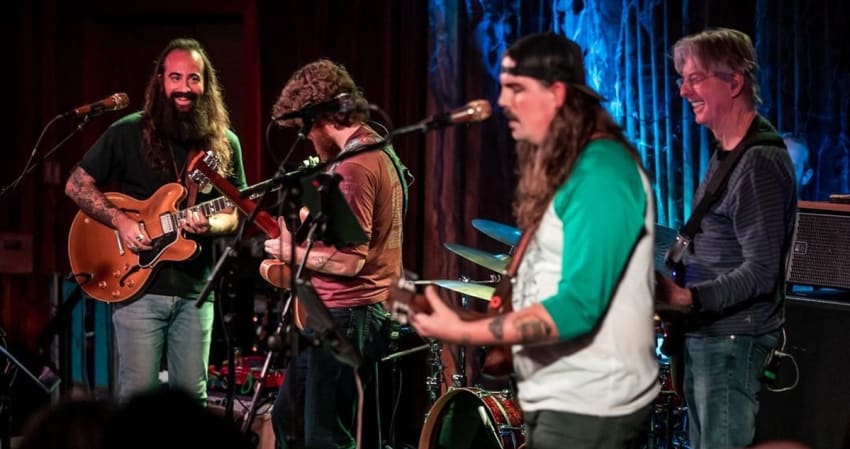
(L-R) Ross James, Grahame Lesh, Alex Koford, Phil Lesh / Photo by Paul Citone
Terrapin Crossroads instantly provided a space for indelible musical moments. Starting with its opening run of shows, the venue facilitated lasting memories for fans and performers alike. Many of those memories were as lasting for the musicians as their first instances meeting and performing with Phil Lesh.
Nicki Bluhm: I was part of Phil’s band for the opening weeks in the bar. I remember rehearsing a lot and being fed really delicious lunches. The first shows there were a bit rough around the edges but over the years the production became incredibly dialed in. I think the Grate Room ended up being one of the best-sounding rooms of its size in the country. The experience Phil and [his wife] Jill [Lesh] created was chic, casual, inviting and above all, the focus was on the quality of sound and musicianship. A winning combination to the strong community they built.
I first met Phil on stage when we were both sitting in with Jackie Greene at The Fillmore in San Francisco. I remember thinking, “Wow, I can’t believe I’m on the same stage as Phil Lesh, my brother is gonna be so jealous!” We went on, of course, to play many more shows together including the opening weeks of TXR and for many years to follow (and still going!). Phil is quiet, contemplative, kind and funny. He is so inclusive and supportive of upcoming artists and I am honored to be one of them.
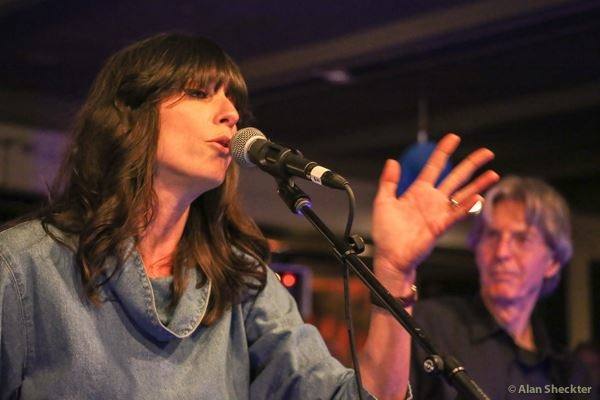
Photo by Alan Sheckter
Lebo: The first time I met Phil was on stage at a soundcheck for a gig with him! It was an unusual gig as it was what would become the first annual TXR Passover Seder. Basically, they hosted a Passover seder which was followed by a set of music in the Grate Room with Phil, myself, and some of the TXR Family Band members. The set was comprised of Grateful Dead songs that related to miracles and to freedom from the bonds of slavery. Turns out there are a lot of Dead songs that can be interpreted through this lens. At any rate, it was a total hoot and pretty much right after that they started calling me for Phil & Friends gigs.
Ross James: I started playing in a band with Brian. He had posted an ad on San Francisco Craigslist, looking for a guitar player and I responded and auditioned and got the gig. I remember the second or third time I went over to their house to record, Phil sort of greeted me in the driveway and helped me carry my gear. I remember it really vividly. He’s just like, Brian’s dad. That’s kind of who he’s always been to me, you know? Just walking in and he’s like, “watch your step here.” There’s two steps down and he’s helping me get my stuff … I was carrying my Fender twin [amp] and he was talking about how he loved that amp and how they used to use them in their band back in the day.
Alex Koford: I can’t specifically recall my first show at Terrapin but it wasn’t too long after I got a job there. Ross James and Brian Lesh had a band called American Jubilee and we went out to Stinson Beach for a couple of days to record an EP. I wasn’t in the band at the time but while we were there we drank some cosmic tea and one thing led to another. I borrowed some cowboy boots from Ross and stomped on a wooden table for one of the tracks. I guess that was my audition to the band and after that I started playing shows with them at TXR. It was all so organic and blurry!
CMAC: Early on, myself, Ross James, Brian Lesh, Scott Padden and Alex Koford formed an original band called American Jubilee and Phil took us out on an East Coast tour opening for Phil & Friends every night. That was something I will never forget.
Ezra Lipp: I think I came down one night shortly after moving to San Anselmo just to check it out more and Phil was playing in the bar with some of the regular guys at the time who at the time were the first batch of TXR staple musicians. I remember Ross James and Alex Koford were there. I remember them playing “Brokedown Palace” at the end of the night and it must have been an unannounced appearance by Phil as I don’t think there were a ton of people there (definitely not as many as you’d expect for a night with Phil). But I remember Phil just seemed so present and purposeful with every note on that song. Even though he’s played that song and all the others thousands of times, I felt like he was approaching it as if it was a sacred piece of music he had never played before.
I started connecting with Ross James (who was organizing a lot of the musicians at that time) and the other guys there throughout the start of 2014 and started getting calls to play somewhat regularly at the bar around that summer. Sometime in the fall, Ross invited me to play at one of the TXR Ramble’s in the Grate Room along with Phil and a bunch of the other players on the scene at the time. Stu Allen, Lebo, Reed Mathis, and all the other usual suspects. I think the first song I played with Phil happened to be “Sympathy for the Devil,” which I thought was rocking and felt like Phil and I locked right away. When the song ended Phil looked over at me and was smiling but said “Can you hear me alright?” I didn’t know how to interpret that at the time so I just said “yes.”
The rest of the night I thought was awesome and the next morning I got an email asking if I would play a “Grateful Dead Recreation Show with Phil Lesh & Friends” a couple of weeks later in the Grate Room with Phil, Stu Allen, Jeff Chimenti, Elliott Peck, and [Phil’s son] Grahame Lesh (which would be the Veneta ‘72 show) so I’d say I’d passed the audition!
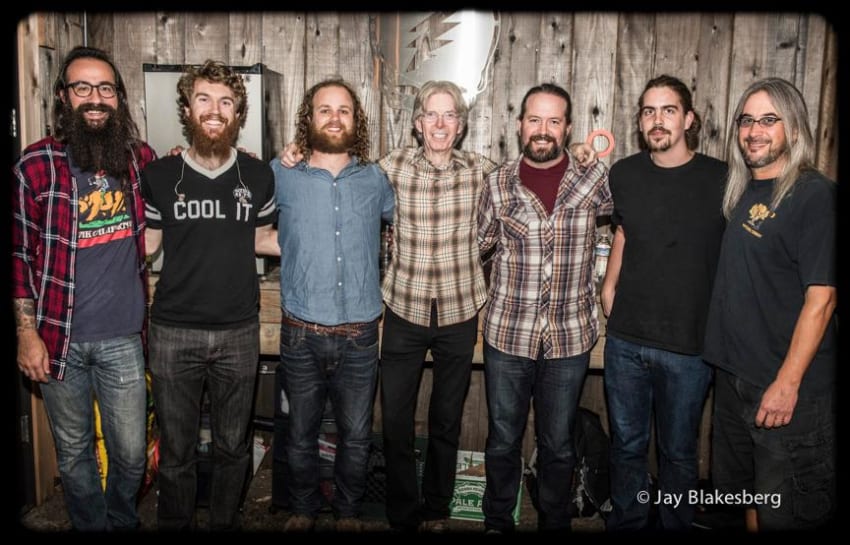
(L-R) Ross James, Grahame Lesh, Ezra Lipp, Phil Lesh, Stu Allen, Alex Koford, Jeff Chimenti / Photo by Jay Blakesberg via ezralipp.com
Paige Clem: The first time that I played at Terrapin, I’m pretty sure it was Jay Blakesberg’s Jam Book release, which was maybe 2013 or 2014. Jay put together this amazing party in the bar to debut his new photo book of guitar players and put together this musical ensemble, I think it was American Jubilee was the house band with a ton of people sitting in and he asked me to sing a song. And that was the first time I was on stage there. Honestly, it was the first time I met a lot of those people. I’s funny because some of those people are my closest friends now.
Lebo: The first time I entered the Grate Room, I immediately thought to myself – “Ah, this place was designed by musicians and they put the music first”! By that, I mean that their decisions on how to create and layout the space seemed solely driven by what would serve the music best. For example, the stage was much bigger and more spacious than you would typically find in a room that size. Most venues would not allow this because having such a big stage eats into the max capacity of the room, which in turn means selling less tickets, which means they make less money. Another example of this “music first” attitude would be the sound system – it was super pro and much nicer than any comparable rooms. Again, this was driven by what would serve music best, not just “what can we get in here that will do the job.”
CMAC: The very first time I really got to hang and carry on any type of conversation with Phil was when Furthur played Terrapin, in the Grate Room in June of 2012. I was driving across the Richmond bridge and got a phone call from Phil’s bass tech and tour manager Robbie Taylor. He had remembered me from the Rambles that just happened in May and told me that the usual tech for Furthur had an obligation with another band that was on tour and couldn’t make the TxR shows. He asked me if I would be able to guitar tech for John Kadlecik, keyboard tech for Jeff Chimenti, drum tech for Joe Russo (I had never drum tech’d before) and tech for the two background singers. I said yes and showed up for the rehearsals leading up to the shows. Had a few brief interactions with Phil and Bob Weir and just did my thing.
Ross James: My first time playing at Terrapin was the first night that we were ever open. I think we called it the soft opening. We did four shows kind of in the bar … I didn’t know any of the songs. I’d never even heard most of the songs in my life. I was going to just be doing sound and then Phil wanted me to play for some of it. He ended up wanting me to play all four shows the whole time. So, I didn’t know any of the people we were playing with – Railroad Earth guys, Jeff Chimenti was there.
Bobby [Weir] played with us the last night and Tim [Bluhm] and Nicki Bluhm were there and Jackie Greene. I didn’t know any of those people. I didn’t know any of the music. And I was actually running sound. It was running monitors and front of house while playing, and I didn’t know any of the music. So that was, that was a little bit of a baptism by fire.
Scott Guberman: I was luckily recognized by a friend of a friend who was originally from the East Coast, which is where I’m from. We were out [in California] on vacation. He invited me to come up on stage and sit in for a couple of songs or for the second set. From there everything snowballed. Some of the guys in that [afternoon show] lineup – these were all ad hoc lineups put together by Terrapin on a daily basis – a couple of the guys said, “come join us for the nighttime show,” which I did. From there it was, “Hey, we’re playing brunch tomorrow. Come join.” And it just kept going and going and going before you knew it, or our little vacation and turned into a permanent home here at Terrapin.
I got to have a very, very brief conversation with [Phil] while we took a picture and I basically told them I came out here just to do exactly this and let you know who I am. I’m a professional keyboardist and I’m very worthy of playing with you. And his response was, “Stranger things have happened.” And that was that. It was quite a memorable first experience. I’d finally gotten to do what I had set out to do for most of my life, which was meet Phil.
My first impressions were, “Hey, here’s a nice guy.” Here’s a musician that’s been at it all his life, that’s been playing with just one band his whole life up until the Grateful Dead went away. He seems open to just some guy saying “I’m very worthy of playing with you.” I couldn’t tell how open to that he was, but he was just so friendly and listened and was just a real nice guy to be around.
CMAC: I played, rehearsed, and worked in the Grate Room a bunch during my time at Terrapin. I loved that room. It was a really great sounding room, acoustically treated and designed by the master himself, Derek Featherstone. The first time I actually walked into the Grate Room it was still at its early stages, before the treatment. It was close to completion by the time Furthur played there. A really big difference in the look and sound of it.
Alex Koford: I’ve known Phil all my life. Our families have been entangled since before I was born. He’s kind of like my cool, weird uncle.
From its beginning through its end, Terrapin Crossroads was the site of many outstanding collaborations facilitated by the venue’s welcoming vibe for musicians who happened to be in the Bay Area. Countless musicians appeared onstage at TXR over the years, sometimes scheduled and other times not.
Ross James: I always loved it when my role changed at Terrapin and one of my favorite things that I got to do was help put Phil & Friends lineups together. The first time I had that opportunity, I thought, well, let’s see if I can get Bill Frisell to do it. I got in touch with Bill’s management and yeah, he’s down to play with Phil.
And I then I thought, well, this is the coolest job ever. Having Bill Frisell come was really, really awesome. I’m a huge fan of his and, and seeing his take on the Grateful Dead catalog was really neat. He also ended up playing a show of his own, the following day. It was a sold-out seated show with his band. In the crowd that night were Bonnie Raitt and [Metallica’s] James Hetfield. They both bought tickets. They didn’t even call, they both bought tickets to come see Frisell. So that was a pretty special collaboration.
Alex Koford: John Mayer showed up one day during the lead-up to the Fare Thee Well Grateful Dead 50th anniversary shows. [Phil & Friends] had been recreating GD shows from every year as a tribute to the 50th anniversary of the band. It was a big surprise and this was before Dead & Company so Mayer wasn’t exactly the guy anyone was expecting. He played a couple recreation shows in the Grate Room with us but the real magic for me came when we played a late-night bar set. Phil, Mayer, Ross James, and myself played a few GD tunes for an enthusiastic packed crowd. I’ll never forget singing harmonies with Phil and John backstage warming up for the show.
Scott Guberman: Phil chose one show from every year of the Grateful Dead to recreate. So we were into the 1970s, we were supposed to do a ‘72 recreation for 1972 and we’re in the dressing room getting ready and last-minute Phil comes up to me and Stu Allen and puts his arms around us and says, “Hey, if it’s okay with you guys, John Mayer’s here and he’s gonna sit in.”
We looked at each other in disbelief, but yet, played it professionally and said, “sure, no problem. That’d be fine.” Just cause you know, you wouldn’t expect John Mayer. This was way before Dead & Company and him to becming a Deadhead. We only knew him as a young pop star, so it was completely unexplained. And fun.
Nicki Bluhm: I remember playing a Phil & Friends show in the Grate Room with Neal Casal and Adam MacDougall. After the show we went out to the fire pit in back and just sang songs acoustically for the crowd who was still there. It was a really special moment of connection for both the musicians and the audience. TXR fostered that kind of intimacy in the community; everyone was family.
Lebo: One of the most consistent traits of the TXR experience was “memorable/unexpected” collaborations. But to be honest, the most memorable collaborative experience is one that I was fortunate to have many many times. That was the experience of playing music with Phil Lesh. I learned so much about music through playing with him. He’s a heady dude, and deep into concept. I love that about him, and it’s a quality that really resonates with me. Besides having some big musical breakthroughs on stage with him, I found that the backstage conceptualizing was equally memorable …
Many unexpected things happened on stage at TXR! I’d say among the most surprising, was the time that I turned around mid-set and saw [Grateful Dead guitarist Jerry Garcia’s guitar] Wolf sitting in a guitar stand! It was during a two-night run down there with Phil & Friends. There had been a rumor floating around that the guitar might come out to a show sometime, but it was all unsubstantiated and had kind of faded out of my mind. Then one night there we were, right in the middle of a song. I turned around to get eyes with drummer John Molo and right there, sitting in my guitar stand was Wolf. Sure was fun to play that guitar that night!
Along with Terrapin Crossroads’ Grate Room main stage, the bar area in the restaurant also hosted countless performances. While many of the sets were planned, others were impromptu, leading to unexpected collaborations and other once-in-a-lifetime experiences.
Nicki Bluhm: The opening weeks of the bar were really exciting. Phil stacked the band with amazing players and I was lucky enough to be asked to join. It had an immediate feel of community and warmth. People were so stoked to have a place like that to go and to gather. The energy was magic.
Lebo: In my mind the bar was actually the heartbeat of TXR. I met so many musicians and fostered so many relationships there that I’ll have for the rest of my life. You gotta understand that for the most part, they didn’t book “bands” in the bar, rather, they booked constantly changing lineups of musicians. The beauty of this was that it kept everything very in the moment. You didn’t have some rehearsed act coming in there to show you all of their well-planned tricks. Instead, you had a bunch of great musicians listening to each other and reacting. There were so so many memorable sets in there, but one that stands out to me was one of my first times playing in there. It was a book release party for photographer Jay Blakesberg – perhaps it was his Guitars That Jam book? At any rate, there were a whole bunch of musicians in the house – some I knew, and some that I was just meeting for the first time. We played into the night and it was right there and then that I realized just what a special place this was gonna be.
CMAC:The bar stage was the beating heart of Terrapin. Before COVID, there were shows seven days a week there. Weekends had two shows each day. The bar is really where you got to try things out, whether it be a new song you just wrote, a new cover you just learned, or play with musicians you’ve never played with before. It was such a cool atmosphere where anything went. I have so many memorable moments there. I, along with maybe Stu Allen, played that stage more than any other musician. I also did sound in the bar, on a regular basis, for the first three years. One moment that really stuck out to me was when Neal Casal was hanging around Terrapin for a week, playing with Phil in the Grate Room and also doing bar shows. He agreed to play a show with my band at the time. He was so nice and sweet and even agreed to come over to my rehearsal spot and rehearse for a few hours. We played a super fun show with him. Got to play a number of times with him and other great musicians just like him over the years.
Ross James: The bar at Terrapin, that was my favorite part about that room. So many special things happened, even in the beginning. One of the first things that happened that was really kind of neat was after they filmed the Move Me Brightly livestream or video concert (whatever you want to call it) at TRI, all those folks came over and just had a little hootenanny in the bar.
I mean, I remember Jonathan Wilson and Neal Casal and Jon Graboff. They were all there – everybody was. My guitar was the only guitar there. So everybody was playing my guitar and it soaked up a little bit of mojo that night, for sure.
My 30th birthday in the bar was really special. I got to put the band together and make a three-set setlist and got to play with my best friends and in one of my favorite places. It was really, really a special night.
CMAC: It took about a year or so to expand on the musicians who played there. I took over booking the bar around 2015 or so and really made it a point to diversify the bands a lot more. The best part, in my opinion, about the bar was that you could throw a group of musicians that had never played a single note together on a night and see what happens. Most of the time it was great and so cool to experience. My own band formed out of these random lineups. You just started to meet and play with musicians that you never would have played with if it wasn’t for Terrapin. Come to think about it, I know of a handful of bands that formed at Terrapin and are still playing today.
Paige Clem: Playing in the bar at Terrapin kind of became my standing gig for Paige & The Clementines and I’m so grateful for that. It was just always nice to know that I had that show on the books. As a local musician and singer-songwriter, you don’t always have the benefit of knowing that you’re going to be able to have a full house. It’s not always easy and Terrapin was such a wonderful place because there were always people there that were eager to hear music.
It was very gratifying in terms of the response that I would always get with the crowd there. The staff was amazing. They were always so sweet and lovely to me and kind and made me feel good.
The more that I played on that stage, the more comfortable I got and I really started to settle in. It was kind of like an incubator for me, where I was at the time developing my own projects. I hadsung in different bands and done different things, but Terrapin was a really great place for me to get my sea legs with establishing a band around my own music. And what an amazing thing … I really, really miss it.
CMAC: When Trey Anastasio came and played the bar stage, that was pretty cool and special. When Gregg Allman came and played, I did sound for the Gregg performance and got to chat with him for a brief amount of time before he played. He was very nice and humble. He forgot his capo for his guitar and asked me if I could find him one. I reached into my backpack and gave it to him for the show. I will always treasure that capo.
Alex Koford: The unexpected was always part of the experience at TXR. It was an important physical, mental, and spiritual piece of the Terrapin experience. “Keep it weird” became the unofficial slogan of the joint, and we all maintained that spirit in everything we did.
Ross James: The most unexpected thing that happened on stage at Terrapin I think that would probably be when [actor/musician] played in the bar, that was rather unusual. When he played Sammy Hagar showed up. That was a really, really unexpected evening, but after a while, nothing really became unexpected.
Evident from the start, a rich community of musicians quickly coalesced around Terrapin Crossroads. The venue’s inviting atmosphere across the restaurant, bar and Grate Room allowed music fans from the Bay Area and beyond to feel like welcomed parts of the community. Musicians who regularly performed at TXR were informally and formally known by such monikers as The Terrapin All Stars and The Terrapin Family Band. Some joined each other in various side and solo projects as well.
Lebo: Lots of folks cycled through there, but only some stayed and got asked back regularly. Really grateful to have been one of the people that found a home there. I think there are certain qualities that fit well there. Obviously, you had to be a good musician, but that was just the pre-requisite. One quality that everyone who became part of the family possessed was the musical ability to be chill under pressure. It was very common to find yourself onstage with someone calling a song you’d never heard before. They might tell you a few hints, but once they counted it off, you essentially had to be able to just listen and react and make something special out of it. If you couldn’t do that, you weren’t going to be around for long. It was a very “be here now” type of atmosphere.
Ross James: I got a sense that our community was forming at Terrapin the very first night that we did a soft opening. Like I said, I didn’t know any of the music. I didn’t know the scene, the fans, the vibe, any of it. People are waiting, lining up hours before the music’s going to start. And it was just such a welcoming scene, you know?
I made a couple of friends that night, this guy Sam, and this other buddy of mine Brian, who runs Deadheadland. I remember meeting them both that night and being like, wow, this is crazy. These people are very dedicated! Fast forward 10 years and I still keep in touch with them and I’ve grown close with those dudes over the years.
Ezra Lipp: It really wasn’t until I started playing the music in the Bay Area at places like Terrapin that I got a sense for just how special, even sacred, this music was to so many people. Sure people always come to party and dance and get lost in the music and that’s great, but I think for a lot of people it’s even more than that. It’s a form of spiritual entertainment. It’s about communion with spirit, it’s about transcending one’s self in service to the moment and to the whole. The concert is a place of worship and the songs are the psalms and prayers and gospel. The moments of unexpected magic is where the divine shines its light. I know this may sound a little exaggerated but I actually don’t think it is and I think most Deadheads would agree with these analogies. So as someone involved in creating the music and presenting it as not a relic from the past, but a living breathing body of songs, I think of myself as having an important responsibility in that context as I know people take it really seriously.
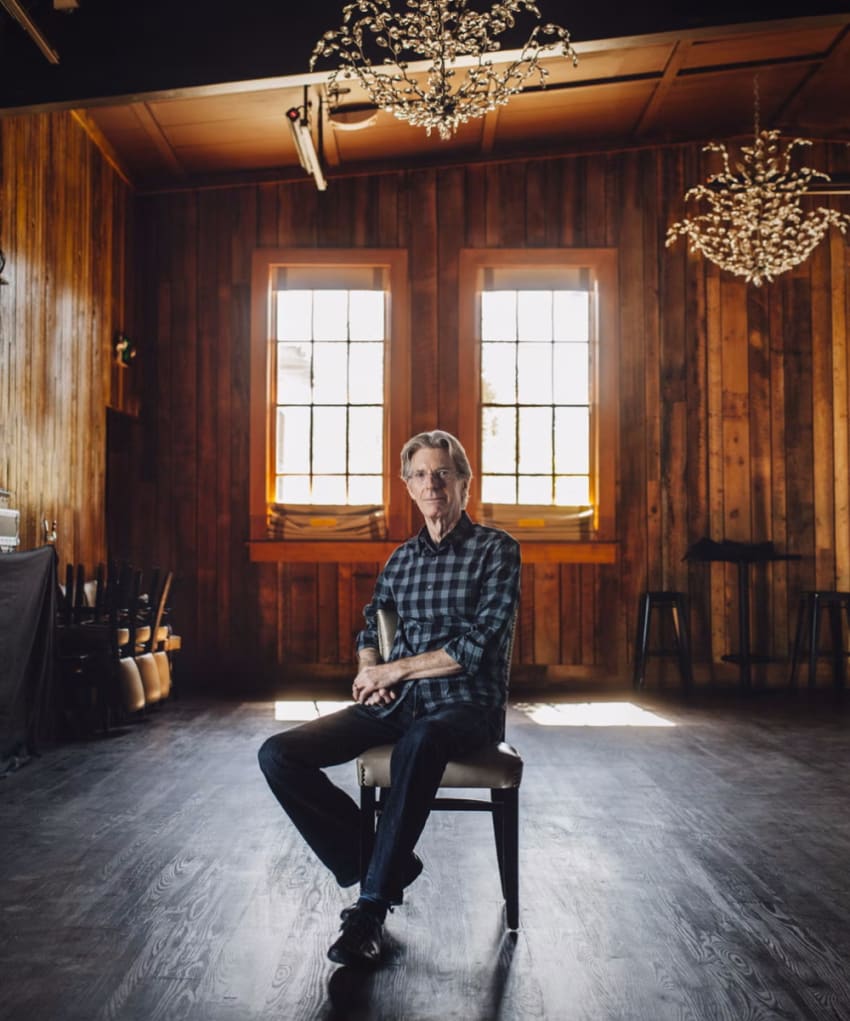
Photo by Timothy Archibald
Ross James: To be a part of the group of musicians around Terrapin was probably one of the most special musical parts of my life. The way that it constantly was growing and expanding and the open arms that everybody had with inviting new people, no matter who they were – if it was somebody who’d been doing this for decades at an incredibly high level or a local musician. It was an incredibly unique and special thing to be a part of that. I’ll always cherish.
Paige Clem: It was pretty mind-boggling for me to be part of that. I knew a lot of musicians that were playing around Terrapin and I was doing my own thing and slowly in my weird ways, you know, managed to get to know more people.
Getting asked to do a sit-in here and things like that and got to know CMac who was booking it. It just kind of grew over time and I got to know more and more people and, oh my gosh, it was so special. Just the smiles and the warmth. Those times at Terrapin where you’re there having a musical experience, a shared musical experience among the musicians, but with the audience and the people that are there – there was just so much joy. It was a really light, lovely night where everybody was just happy. You’re just in a really good place. It was a place to go and get away from whatever else was going on and just be present with music and lovely people that you shared a vibe with.
Nicki Bluhm: To be welcomed into the Terrapin Family is something I will never forget and something that will never end. I remember watching Phil that first year, playing so many shows and admiring his stamina and work ethic. He was (and still is) such an inspiration to me. I made so many friends and further developed friendships I had during those years. Those are bonds that will never be broken.
CMAC: It was a true honor to be one of the “house musicians” or Terrapin All-stars, as we were called in the earlier days. Through booking there I personally got to know a very wide variety of musicians that coalesced in that scene. Many new friendships were formed.
Alex Koford: My experience there was essentially a unique version of college. I was a child in so many ways when I started my TXR experience. Throughout the years I learned and grew in every aspect of my life. TXR introduced me to my dreams and allowed me to develop my craft. It still means everything to me. TXR may be gone but the friendships will last a lifetime.
Ezra Lipp: The community of musicians that formed around TXR was truly amazing. I could list all the personnel involved from all the local musicians that were integral to forming its core cast of players, to all the A-list touring musicians from all over the country that rolled through but it’s been documented and that’s not entirely the point. What is so special about what happened there is the level of collaboration and cross-pollination the musicians got to experience is really unparalleled. In a typical rock ‘n’ roll equation you have the people you play with in your band which is limited to a few members which you are playing with regularly. And normally one would play locally or tour with just those people in their band. Of course then there are festivals where the chance of collaboration goes up with a little more room for musicians to hang with each other and sit in with each other but that usually only lasts the weekend at most and then you are back to your regular group.
With TXR there was an amazing list of musicians that on any given night could be put together in a unique ensemble that was mostly an ever-rotating cast of great players. Of course, as this continued night after night, week after week, compounded over years there ended up being not just a few musicians anyone got to know and play with but dozens of great musicians that all got the opportunity to regularly play together. Without the context of Terrapin Crossroads, I don’t see how this would have happened. And new bands of course formed out of these relationships.
For instance, I’m not sure I would have started Magic In The Other in the way I did had it not been for the relationship that deepened getting to play with Steve Adams at Terrapin. Similarly when ALO was looking for a new drummer in 2018 I’m not sure I would have gotten the call had it not been for the time I got to know Lebo and Steve more playing at TXR. And when it came time to record my most recent solo album that came out this spring, I had a roster of amazing musicians to call on to help me bring this project to life. Had those relationships not been formed over the years at Terrapin it may have looked pretty different.
For the musicians we spoke to, their final times playing onstage at Terrapin Crossroads were events whose memories will last their lifetimes. Some of those we spoke to were there for the final performances at TXR, which officially closed its in November 2021. It was clear from their experiences that the community of musicians will carry on the legacy of Terrapin Crossroads in many forms.
Alex Koford: Phil & The Terrapin Family Band played some shows over the summer of 2021. If I’m not mistaken Fourth of July was the last show I played at TXR. It was magical to come back after so much personal change for me. I had moved to Los Angeles in 2019 and of course, 2020 brought the pandemic which put all music on hold. Returning home to Terrapin was surreal and beautiful.
Ross James: I think the Fourth of July weekend was the last time I was out there. We did a few nights, or a few afternoons, I suppose, in the park. And I did two runs in summer 2021. That was the only time I’d been there in a couple of years. It was really nice to get to go there one more time. Before it all went away.
Nicki Bluhm: I played the outdoor stage just weeks before the closure. I’m so grateful I got to play there one last time. It was such a welcoming place to come home to California and play. All my friends, family and fans got a chance to gather one last time.
CMAC: My final show at TXR was in November of 2019 in the Grate Room. My band, the The Casual Coalition, performed The Rolling Stones album Exile On Main Street in its entirety with horns and all. Neal Casal and I had a mutual love for this album and we had been talking about him doing this show with us when I originally decided to do the album. Sadly, he passed away a few months before, so we dedicated the night to him in his memory. An even more special thing was that Phil bought a ticket for this show and came backstage to hang before we played. Super cool.
Ezra Lipp: I played the last ticketed show at TXR with Stu Allen & Mars Hotel outside at Beach Park on Halloween a couple of weeks before they closed their doors for good. It was actually a pretty emotional experience for me. It was a really fun show with lots of special guest musicians from the Terrapin community and energetically peaked towards the end of the second set during “Goin’ Down The Road Feeling Bad” with something like eight musicians on stage and a sax player on stilts walking out in the crowd with a wireless mic. I thought Stu put together a beautiful and fitting setlist that night with heavyweight GD songs like “Terrapin Station” and “Days Between.” However I felt like the encore was when things really got emotional for myself and the crowd as we rolled out a triple encore of “Brokedown Palace,” “We Bid You Goodnight,” and finally “Box of Rain” to close things out. I thought it was a really special tribute to Phil and Jill Lesh who without them none of this would have ever happened. I definitely had to make an effort to hold back some tears at the end of the show, especially while looking out into the crowd and seeing other people who weren’t holding them back. Terrapin really changed my life in a lot of ways and it was strange to think this would be the last time I would be playing there (or really anyone would).
There is definitely a loss in its absence now and I think we all feel it and I don’t think it can ever be replaced in the way it was. Truly lightning in a bottle for nine years straight. At the same time, there are many musicians from the Terrapin scene that are starting weekly Grateful Dead nights at clubs all around the Bay Area. So that’s really cool to see lots of little scenes popping up in different places, though without a centralized home I think of it as the Deadhead diaspora.
Scott Guberman: I’m proud to say my final experience was playing the very last show. That was extremely exciting and emotional. Just about every emotion you can imagine went through me that night. It was sad knowing it was going away, which by the way, the musicians had confirmed the knowledge that it was going to go away before the people did. So it was really sad for us and knowing all of that was a big deal.
Lebo: I actually played what would be the very last show at TXR. It was in the beach park. A week or so before they had to be out of there, they decided to have a “garage sale.” They sold everything from t-shirts to baking trays, to bar tables, to soup spoons. It was a beautiful day out there, both sad, and joyous. As we closed out the set with a tearful “Ripple,” there wasn’t a person in the space that wasn’t feeling the feels. I was sad to see TXR close its doors for good, but was filled with gratitude for having been there to take part in that era.
https://www.facebook.com/Deadheadland/videos/4921227564563659/
Ezra Lipp: I feel really grateful and lucky to have been a part of it. Forming those relationships with the other musicians, connecting with that supportive community, and of course getting to play many shows as a member of Phil Lesh & Friends was and is truly amazing and I’m just glad it happened and we’ll all always have that experience to share and reflect back on. Terrapin will be missed!
CMAC: I feel the biggest legacy of TXR is that for almost a decade it brought people, musicians, families, co-workers, fans, and more, all together under one roof to appreciate music and the unity it is capable of bringing with it. It allowed people to shed the stress in their life that they experience everyday and come to a spot where none of that mattered. It was a place where anything could happen. You could be watching some hometown local band and all of the sudden you look to the left and one of your biggest heroes is sitting there enjoying the night just the same as you are. Terrapin was by no means a perfect place. We were always experimenting and trying new ideas. But it had people working there everyday who felt the specialness and uniqueness of what Terrapin was. There hasn’t been a place like it before that I know of, but I hope there will be a place like it in the future, cause we all need that. Especially in this time and age. Somewhere we can all go and get lost in the moment, forget about politics, and just immerse ourselves into the universal language of music.
Lebo: The legacy of TXR will go on forever. Much like the death of an influential person – when they are no longer with us in physical form, they still live on through the actions of all those they have touched. TXR’s positive impact on the musicians and fans that frequented it will ripple on forever, for generations to come and beyond. I’m so grateful to have been a part of it. Long live Terrapin Nation!
Nicki Bluhm: It was a golden era, that’s for sure. Never to be forgotten.
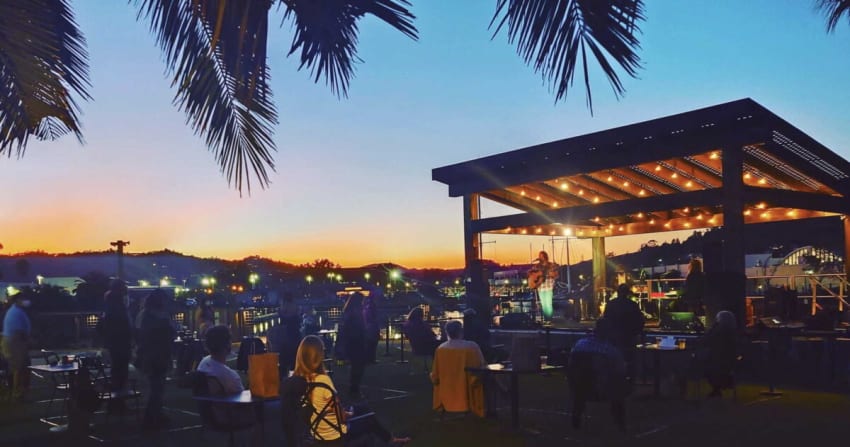
Photo via Terrapin Crossroads
JamBase’s Terrapin Crossroads retrospective will continue with part three featuring many of the fans that made up the Terrapin Crossroads community sharing their reflections and memories. Click here to read the first entry in the series, Terrapin Crossroads’ Legacy: Part 1 – “Some Rise.”

